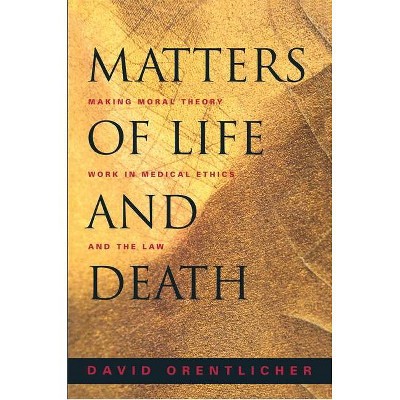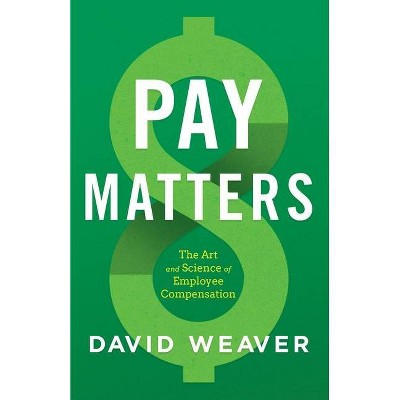Matters of Life and Death - by David Orentlicher (Paperback)

Similar Products
Products of same category from the store
AllProduct info
<p/><br></br><p><b> Book Synopsis </b></p></br></br><p>Philosophical debates over the fundamental principles that should guide life-and-death medical decisions usually occur at a considerable remove from the tough, real-world choices made in hospital rooms, courthouses, and legislatures. David Orentlicher seeks to change that, drawing on his extensive experience in both medicine and law to address the translation of moral principle into practice--a move that itself generates important moral concerns. <p/> Orentlicher uses controversial life-and-death issues as case studies for evaluating three models for translating principle into practice. Physician-assisted suicide illustrates the application of ''generally valid rules, '' a model that provides predictability and simplicity and, more importantly, avoids the personal biases that influence case-by-case judgments. The author then takes up the debate over forcing pregnant women to accept treatments to save their fetuses. He uses this issue to weigh the ''avoidance of perverse incentives, '' an approach to translation that follows principles hesitantly for fear of generating unintended results. And third, Orentlicher considers the denial of life-sustaining treatment on grounds of medical futility in his evaluation of the ''tragic choices'' model, which hides difficult life-and-death choices in order to prevent paralyzing social conflict. <p/><br> <i>Matters of Life and Death</i> is a rich and stimulating contribution to bioethics and law. It is the first book to examine closely the broad problems of translating principle into practice. And by analyzing specific controversies along the way, it develops original insights likely to provoke both moral philosophers and those working on thorny issues of life and death.</p><p/><br></br><p><b> From the Back Cover </b></p></br></br><p>"Written by a well-known and respected author, this book reflects careful scholarship by someone who has extensive experience in the field and creative insights. Its significant new perspective is Orentlicher's claim that there is no clear answer to many of the most important questions in bioethics because of indeterminacy in bioethical theory. The result is a nuanced pragmatic analysis that shows the flaw of many attempts--both liberal and conservative--to translate theory to policy."<b>--Robert Veatch, The Kennedy Institute of Ethics, Georgetown University</b></p><p>"This book represents a solid contribution to the field of bioethics by a distinguished lawyer, physician, and ethicist. It engages topics of salient concern with a consistently cogent and controversial perspective. It is clearly written and should be of interest not only to lawyers, but to everyone in the field of bioethics, and indeed to the general reader, as well."<b>--Bruce Jennings, The Hastings Center</b></p><p/><br></br><p><b> Review Quotes </b></p></br></br><br>By drawing our attention to future real life implications of the implementation of moral principle, this book forces us to reevaluate the balance between theory and practice and is thus well worth reading.<b>---James A. Anderson and Charles Weijer, <i>Journal of the American Medical Association</i></b><br><br>A highly thoughtful and useful contribution to our understanding of how moral principles can be translated into practice, with substantial benefit to individual patients and, as well, to the health care system and our larger society.<b>---Dale H. Cowen, <i>The Journal of Legal Medicine</i></b><br><br>Orentlicher makes a compelling case that our understanding of bioethical controversies could be improved by considering how moral concerns are translated from principle into practice.-- "Choice"<br><p/><br></br><p><b> About the Author </b></p></br></br><b>David Orentlicher</b>, MD, JD, is Samuel R. Rosen Professor of Law and Codirector of the Center for Law and Health at Indiana University School of Law-Indianapolis. He is a member of the adjunct faculty at Indiana University School of Medicine, a coauthor of <i>Health Care Law and Ethics</i>, and coeditor of <i>Health Care Crisis? The Search for Answers</i>.
Price History
Price Archive shows prices from various stores, lets you see history and find the cheapest. There is no actual sale on the website. For all support, inquiry and suggestion messagescommunication@pricearchive.us




















